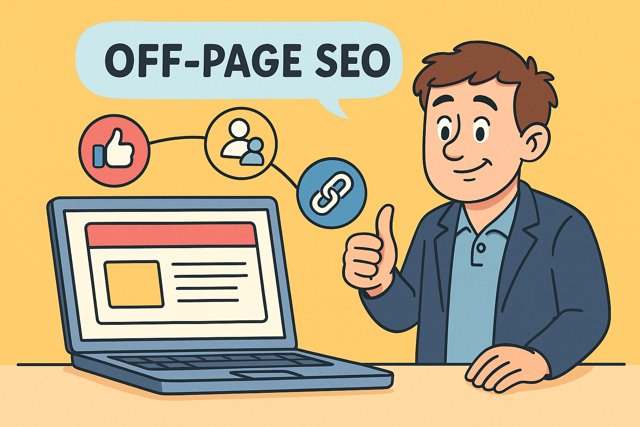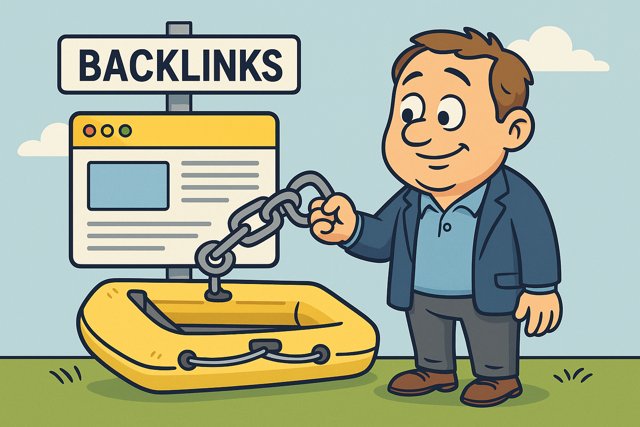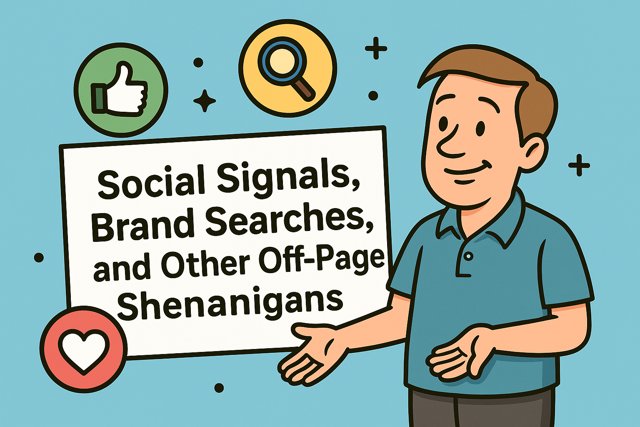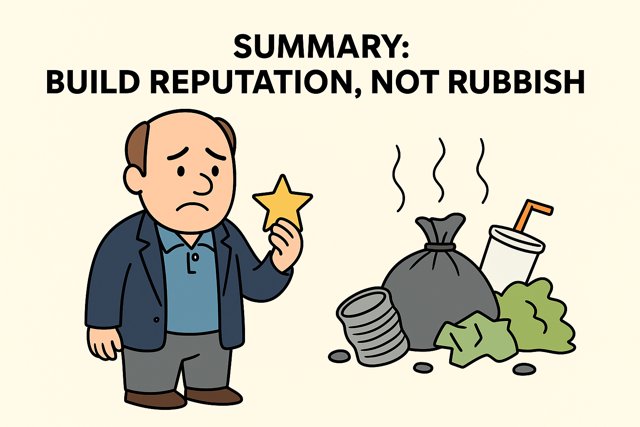Introduction: What the Hell Is Off-Page SEO?

So, you’ve tidied your digital house (on-page SEO), fluffed the cushions (headings and meta tags), and lit a scented candle for Google’s bots. Lovely. But here’s the kicker: Google doesn’t just care about what you say about yourself — it wants to know what everyone else thinks too.
Off-page SEO is like your online reputation. Not what you tell people at the pub, but what the pub landlord tells everyone about you when you leave. It’s how the internet whispers behind your back — and whether those whispers say “legend” or “dodgy Darren who sells used rods and tax advice from the same van.”
1. What Counts as Off-Page SEO?
Let’s be clear. It’s not just “get backlinks” — that’s like saying “just get rich.” Off-page SEO is all the stuff that happens outside your website but still affects how Google sees you. It includes:
- Backlinks – other websites linking to yours
- Mentions – people talking about your brand without even linking
- Guest posts – your content appearing on other sites
- Social buzz – shares, retweets, posts (yes, even your mum’s Facebook share helps a bit)
- Reviews – what people say on Trustpilot, Google, or anywhere with stars
- Directory listings – local business sites, niche directories, the digital Yellow Pages
Basically: if it’s not on your site but makes you look good to Google, it’s off-page SEO. It shows you’re real, you’re relevant, and you’re worth ranking. The more authority and attention you attract beyond your own URL, the more Google sits up and listens.
2. Backlinks: The Internet’s Version of Street Cred
If content is king, backlinks are the crowd that shows up to cheer. A backlink is another website pointing a link at your site. But not all backlinks are equal — a shoutout from the BBC is not the same as Barry’s Blog About Bait with six readers and a tendency to crash on Tuesdays.
To Google, backlinks are votes of confidence. If enough decent sites link to you, Google assumes you’re trustworthy, useful, and not just another one of Darren’s half-baked schemes. And remember, backlinks aren’t just about SEO. They also drive referral traffic. One solid backlink from a popular site can bring in a steady trickle of engaged visitors.
3. What Makes a Good Backlink?
Here’s what makes a backlink actually count:
- It comes from a relevant site
- It comes from a trustworthy domain
- It’s not spammy
- It’s a do-follow link (not marked “nofollow” by the site)
Darren’s Link-Building Misadventures:
He paid £25 for “500 high-quality backlinks” from LinkLord97. Within a week, traffic tanked. His domain got blacklisted. He even started getting spam SEO emails from LinkLord himself. Classic Darren. Moral? Fewer good links > thousands of crap ones. You can’t game the system — not anymore.

4. How to Actually Get Backlinks (Without Selling Your Soul)
A. Guest Posting (The Non-Slimy Kind)
Write quality content for other sites. Sneak in a link naturally.
Example:
- Fishing shop → “Top 5 Starter Rods for Canal Fishing” on angling blog
- SEO expert → “How Local Businesses Can Rank Without Paying Google” on small business blog
Make it helpful. Don’t stuff it with keywords or try to be too clever — just deliver something useful. Pro tip: target blogs with real audiences, not dead domains that exist only for selling links.
B. Local Citations (Directory Listings That Aren’t a Scam)
Get listed on local directories like Yell, Yelp, FreeIndex. Use consistent NAP (name, address, phone) everywhere. If Google sees “Darren’s Rods Ltd” in one place and “Darren’s Tackle Den” somewhere else, it gets confused. And confused Google = no rankings. Also, check for duplicate listings and fix or delete them.
C. Link-Worthy Content
Want backlinks without begging? Make something worth linking to:
- Ultimate guides
- Comparison charts
- Calculators or tools
- Original research
- Funny but helpful content
Data-driven content often performs best. If you can include stats, case studies, or fresh insights, you’ve got a much better shot at earning links.
D. Be a Human: Ask Nicely
Email someone who mentioned your industry and say:
“Hi [Name], loved your article on carp fishing. I’ve got a quick guide on rod selection that might help your readers. Feel free to include it here: [link]. No worries if not — just wanted to say thanks.”
That’s it. Simple. Respectful. No begging. And don’t follow up five times like Darren did. One polite nudge is fine.
5. Social Signals, Brand Searches, and Other Off-Page Shenanigans

A. Social Shares: Are They Worth Anything?
Technically, Google says social shares don’t impact rankings directly. But indirectly? Hell yes.
Viral posts → More traffic → More links → More brand mentions → Google sees the buzz.
Tips:
- Post where your audience hangs out (Reddit, Facebook, LinkedIn)
- Don’t be boring — your title matters more than your first paragraph
- Be present, not spammy
B. Brand Mentions: Links Without the Link
If your business gets mentioned across blogs, forums, news sites — even without a hyperlink — Google notices.
Mentions without links still build trust.
Interviews, Q&As, podcast appearances, forum posts — they all help build your brand’s digital reputation.
Darren’s Failed Social Experiment:
Darren made 14 fake Facebook accounts all named “Darren R.” He spammed fishing groups with his blog post. Got banned. Got mocked. Even got quoted in a knitting forum as an example of how not to promote yourself.
6. Off-Page SEO Mistakes That’ll Sink You Faster Than Darren’s Dinghy
A. Buying Dodgy Backlinks
If someone offers 1,000 links for £10, it’s not a deal — it’s a trap. These links come from spammy directories, private blog networks, or even hacked sites. Google sees through it and will kill your rankings.
Rule: If you wouldn’t show the site to a customer, don’t get a link from it.
B. Comment Spam
Darren once pasted “Great post! Check out my site!” on 300 blogs. Got blocked, banned, and insulted by a vegan knitting group.
Real people hate comment spam. So does Google. Only comment where it actually adds value.
C. Link Exchanges That Feel Like Dodgy Deals
“You link to me, I’ll link to you!” — not always a good move.
Reciprocal links are fine occasionally, but if you do them in bulk, Google sees it as manipulation.
Don’t swap links like trading cards. Make them make sense.
D. Ignoring Relevance
Darren got a backlink from his mate’s plumbing site. Didn’t help. Why? Because plumbing has nothing to do with carp rods.
Stick to links from sites in your industry or closely related niches.
7. Tools and Resources to Help With Off-Page SEO
- Ahrefs — for backlink analysis and competitor research
- SEMrush — to track mentions, links, and citations
- Moz Link Explorer — quick check on your link profile
- Google Alerts — get notified when your brand is mentioned
- Whitespark — great for building local citations
Use these tools to find link opportunities, check your backlinks, and monitor your online reputation. You don’t need all of them — start with one or two and build from there.
8. FAQs About Off-Page SEO
Q: How long does it take to see results from off-page SEO?
A: Weeks to months. Google needs time to crawl, index, and trust your new links.
Q: Do social media links count as backlinks?
A: Not directly for SEO, but they can lead to more visibility, traffic, and natural backlinks.
Q: Should I disavow bad backlinks?
A: Only if you’ve received a manual penalty or have a very spammy link profile. Otherwise, Google usually ignores low-quality ones.
Q: Is guest posting still worth it in 2025?
A: Absolutely — as long as the site is reputable and the content is genuinely useful.
Q: Can reviews impact SEO rankings?
A: Yes. Positive reviews on trusted platforms can improve local SEO and overall credibility.
Q: Can you buy backlinks?
A: You can, but it’s a terrible idea. Google will nuke your rankings if it spots dodgy paid links. It’s like paying people to say they like you — fake, obvious, and gets you banned from the party.
Q: Do I need to build links every month?
A: Not necessarily. What you need is a steady, natural link profile. One good link from a trusted source is better than 20 monthly rubbish ones. Focus on consistency and quality.
Q: Do forum posts and comments count?
A: Sometimes. If your profile is active and you’re adding genuine value, they might drive traffic and build trust. But spammy, one-off comments? Useless at best, penalised at worst.
Q: What’s more important — links or content?
A: Both. Great content without links might go unnoticed, and loads of links to crap content won’t stick. The magic happens when brilliant content earns strong links.
9. Summary: Build Reputation, Not Rubbish
Off-page SEO is not about sneaky tricks or hacks. It’s about reputation.
Google wants to rank the most trusted sites — not the ones with the most tricks.
Remember:
- Earn backlinks from real, trusted, relevant sites
- Share content where your audience actually is
- Build your brand’s reputation over time
- Don’t spam, fake, or beg — it all backfires
If you want long-term SEO wins, be someone people naturally want to talk about and link to.
Don’t be Darren. Be the one people trust, link, and buy from.

Leave a Reply